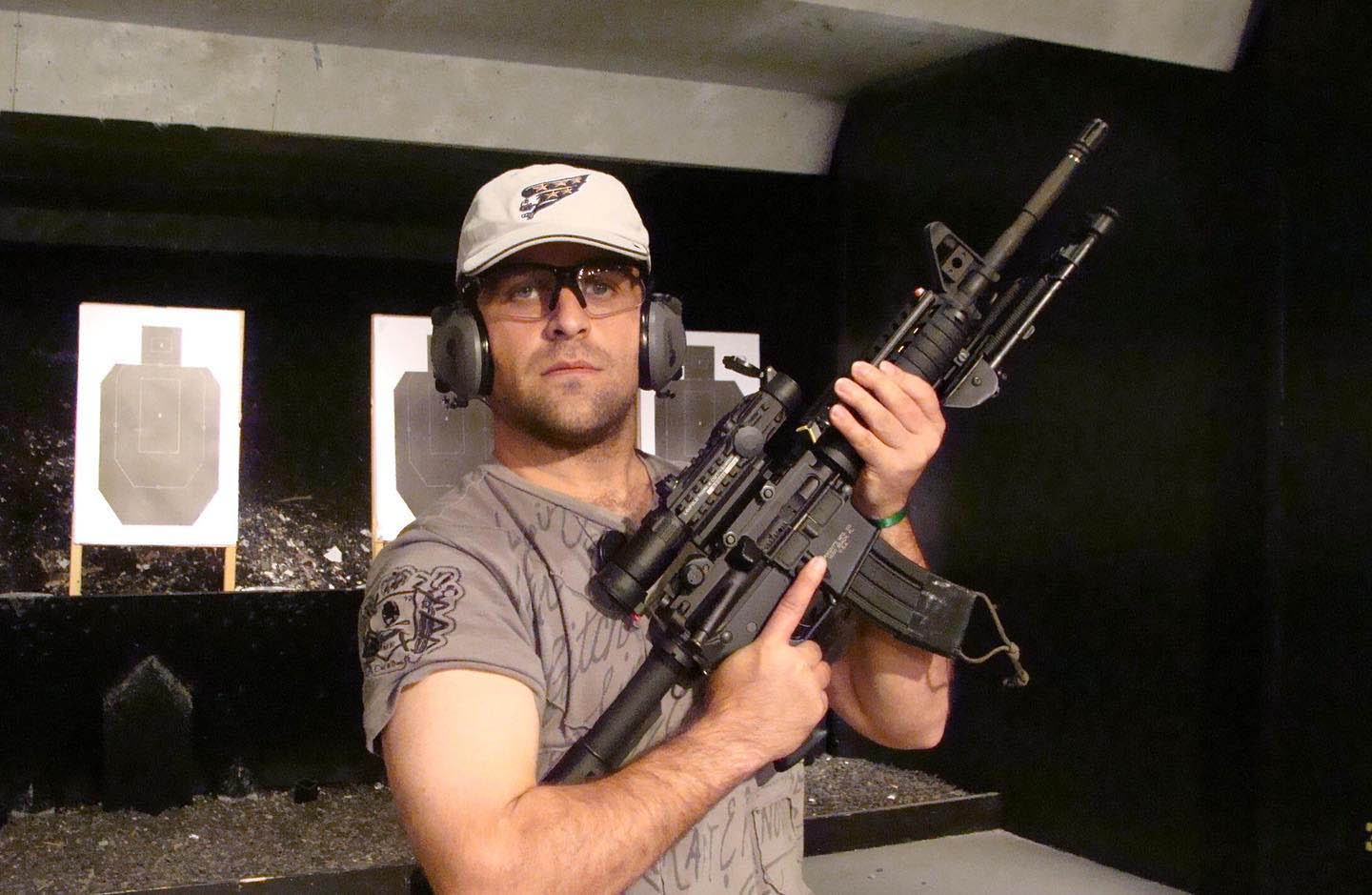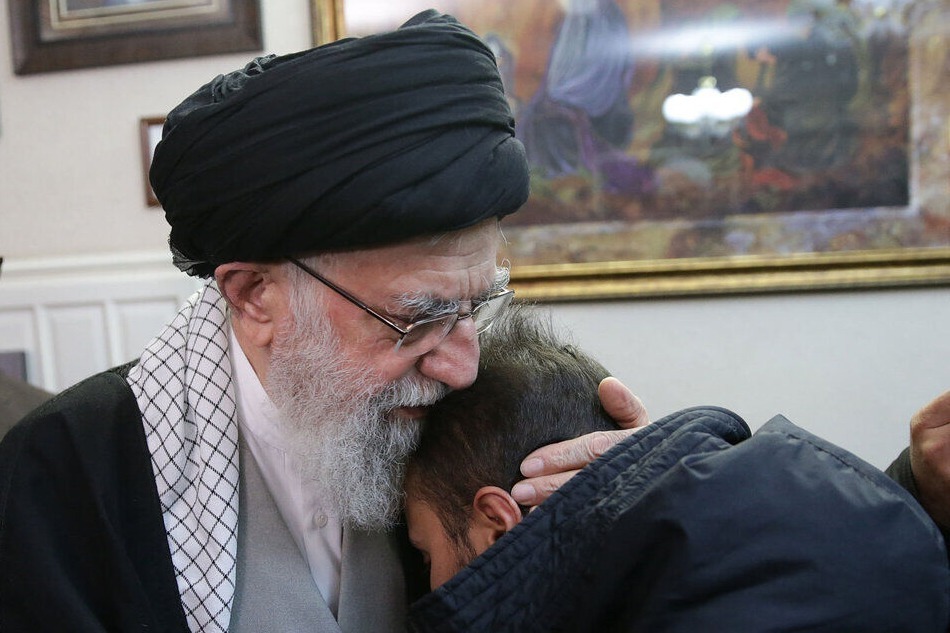The American Enterprise Institute (AEI), which was described as “the intellectual command post of the neoconservative campaign for regime change in Iraq”, previously helped create and fund an anti-Iranian lobby group in Washington DC and now works to confront what it calls the Iran “threat”.
Many US architects of the invasion of Iraq, who have also pushed for bombing Iran, are associated with the AEI, such as former national security adviser John Bolton, who joined the Trump administration directly from the AEI, and former vice-president Dick Cheney, who sits on the AEI’s board.
The revelations raise questions about the extent to which key British ministers, known to be on the right of the Conservative Party, have been cultivated by an organisation promoting regime change in Iran and whether this is influencing current UK government policy.
The AEI describes itself as promoting “American strength and global leadership” as well as “free enterprise”, and is also associated with policies of economic deregulation supported by key figures in Johnson’s cabinet.
‘A very important institution’
In September 2018, Boris Johnson flew first class to Washington for a three-day visit to receive an award at the AEI’s annual dinner. The organisation gifted Johnson £16,846.09 to cover the trip, averaging more than £5,000 per day.
At the ceremony, Johnson told the audience: “Wild horses wouldn’t have kept me away,” adding, “you could have knocked me down with a feather when I got the news … I’m absolutely thrilled to be here at the American Enterprise Institute.”
The AEI event was Johnson’s first donor-funded overseas trip as an MP for more than a decade — since he travelled to Italy in 2007 for a book tour, according to the UK parliament’s register of interests.
Johnson added: “This is a very important institution. I followed the work of AEI scholars and of people associated with this body, for many, many years, and you have been incredibly influential and drivers for change, and for things I believe in.”
The day after President Donald Trump ordered a strike on Iranian general Qasem Soleimani, Matthew Continetti, a resident fellow at the AEI, authored an op-ed, reprinted on the AEI website, which called the assassination a “stunning blow to international terrorism and a reassertion of American might”.
Johnson himself said nothing for two days after the strike on Soleimani on 3 January, but when he eventually made a statement, it was largely supportive of Trump’s action. “General Qasem Soleimani posed a threat to all our interests,” he said, adding, “we will not lament his death”. The US strike on Iran’s top general is widely thought to qualify as a “crime of aggression” under international law.
Johnson’s award from the AEI was presented two months after he resigned as UK foreign secretary, a position he held for two years under Theresa May’s premiership. As foreign secretary, Johnson had said: “I do not believe that regime change in Tehran is the objective that we should be seeking,” adding, “I cannot with any confidence say that would be a change for the better because it seems equally plausible to me to imagine that Qasem Soleimani …could put himself in a very good position to take over”. Four months after these comments, he flew to Washington to receive his award from the AEI.
The AEI is closely linked to the Trump administration. In October 2017, vice-president Mike Pence made a speech at the institute in which he called then-AEI president Arthur Brooks “a friend that sticks closer than a brother”. Pence praised the AEI’s “extraordinary work” before adding, to applause, “President Donald Trump wanted me to say hello to everyone at the American Enterprise Institute. The president sent me here today to say thank you for your strong support of our agenda.”
Pence also told the AEI: “President Trump has put Iran on notice,” and added: “I would submit to you that the work you do here at AEI is crucial to America’s future … I’m here today to assure you that President Trump and I share your commitment.”
Pence was not simply being rhetorical. Within his first 14 months in office, Trump poached six AEI staffers directly from the institute — including his national security adviser — to work in government. Many others in the administration have a historical link to the AEI. The White House website also includes many references to supportive articles by AEI analysts on controversial Trump decisions.
In January 2018, Trump’s CIA director Mike Pompeo — now secretary of state — also went to speak at the AEI. Later that year, the AEI welcomed the secretary of the army, Mark Esper, to speak at its headquarters. Nine months later, he was appointed defence secretary by Trump, a position he still holds.
Funding British ministers
Johnson is not the only minister in Britain’s new government to receive funding from the AEI.
The AEI holds a highly-secretive annual spring conference at the luxury Sea Island resort in Georgia, USA. It has been described as a “magnet for [Republican Party] leaders and members of the business world”, but no information is available on who attends or what is discussed, and every panel and discussion is off the record.
The second most powerful politician in the UK government, Sajid Javid, who is Johnson’s Chancellor, attended his first AEI conference in March 2011, within a year of becoming an MP. He subsequently attended six out of eight AEI annual conferences from 2011 to 2018. From June 2012 until today, Javid has made no overseas trips paid for by a third party except those funded by the AEI. In total, Javid has received £31,285.19 in gifts from the AEI.
Another regular at AEI conferences is Michael Gove, a close ally of the prime minister and now Chancellor of the Duchy of Lancaster, a cabinet position in which Gove closely advises Johnson on policy implementation. Gove has attended every AEI conference from 2015 to 2019 except one and has been gifted £22,763.04 by the AEI over the past four years.
At the 2018 conference, Gove spoke alongside AEI resident scholar Gary Schmitt on a panel titled, “The New Empire Builders: China, Iran, Russia”. What was said at the panel is not known, but in 2018, Schmitt made a video titled “American retreat and the rise of Russia, China and Iran,” for the AEI website. In it, he calls on the US government to “reverse America’s retreat from its decades-long role as the world’s preeminent political and military power” by increasing military spending and projecting power more forcefully against Iran in the Middle East.
Another panel at the conference led by Schmitt, asked, “Is the US military ready to fight and win potential conflicts against revisionist states?” — including Iran. Alongside Gove, Javid also attended this conference, although it is not known if he was present at the panels discussing Iran.
The following year, 2019, Gove was joined in Georgia by another cabinet minister, Liz Truss, who is now Johnson’s Secretary of State for International Trade. Truss was gifted £8,200.54 by the AEI for her four-day visit, the first overseas trip she had made for five years, which was funded by a third party. Pence, White House senior adviser Jared Kushner and Pompeo all spoke alongside Gove and Truss at the 2019 event.
The content of the three British ministers’ speeches to the AEI, together with other details of meetings and itinerary, remains private. Neither does the AEI publicly disclose its funders, so the ultimate source of funding for the British ministers’ trips is unclear, raising further questions about accountability.
It is also not known which, if any, British cabinet members are scheduled to attend the AEI annual conference in Georgia this coming spring. Even the date of the meeting appears to be secret.
On top of the personal gifts, five Conservative government ministers — including the then foreign secretary Philip Hammond — delivered policy speeches at the AEI in Washington between 2014 and 2017. One of them, Nicky Morgan, who spoke in 2014 on “closing the skills gap”, is now culture secretary in Boris Johnson’s cabinet.
Promoting war on Iran
Confronting Iran has been one of the AEI’s signature issues. In 2009 — at the beginning of the Obama administration, which many at the AEI feared would be too dovish — the institute created a “Critical Threats Project” which aimed to “inform and educate policymakers, the intelligence and military communities” about the threats facing the US. The project has two teams, one of which focuses exclusively on “threats posed by Iran”.
The AEI is staffed by many individuals supportive of military action against Iran.
Paul Wolfowitz, George W Bush’s deputy secretary of defence and a key driver of the invasion of Iraq, is a visiting scholar at the AEI, where he works on “foreign and defence policy”. He appeared on Fox News on 7 January 2020, with an AEI background, supporting the US strike on Soleimani. “You know, to get this guy with his number one henchmen on an empty road in the middle of the night when no civilians are going to be killed is a rare opportunity,” he said, adding: “This was the time to do something rapid and bold.”
On the AEI’s board sits Cheney, vice-president in the George W Bush administration, who in 2015 made a speech at the AEI on the folly of the Iran nuclear deal. He lamented that Obama had “effectively ruled out the option of force” and advised him on “maintaining a credible threat of military force”. The Atlantic noted that “Cheney all but proposes war” with Iran.
Bolton, often seen as the most belligerent pro-war figure in Washington, was a senior fellow at the AEI before becoming Trump’s national security advisor in 2018. Bolton, who has worked with the AEI from the 1970s, was eventually fired by Trump because even the president disagreed with Bolton’s overly-hawkish position on Iran.
The New York Times has described Bolton as the “favourite neoconservative of Iranian hackers” and he was apparently targeted in 2014 when hackers stole his identity. “I’m honoured they picked me,” he said. “They must have been looking for the most anti-Iranian regime person in Washington. I’m proud to win that award.” But the New York Times concluded that “Mr Bolton may have been the target, or he may have been collateral damage in a broader attack on the American Enterprise Institute.” The AEI would be an obvious target because of its position on war with Iran.
In 2015, while at the AEI, Bolton had written an op-ed in the New York Times, reprinted on the AEI website, titled: “To Stop Iran’s Bomb, Bomb Iran.” The day after the strike on Soleimani, Bolton tweeted approval, stating: “Congratulations to all involved in eliminating Qasem Soleimani. Long in the making, this was a decisive blow against Iran’s malign Quds Force activities worldwide. Hope this is the first step to regime change in Tehran.”
Creating the Iran Enterprise Institute
The AEI worked in the past with Iranian opposition activist Amir Abbas Fakhravar, the head of an independent student movement opposed to the Iranian government, who was a political prisoner in Iran until he absconded while on prison leave and escaped the country in 2006.
A May 2006 diplomatic cable revealed by Wikileaks, from the US embassy in the United Arab Emirates, notes that Fakhravar was a “please protect” source, suggesting that he was an informer for the US government. It also states that Fakhravar “came to Dubai where he met with Richard Perle and received a US visa to speak about Iran, at the invitation of the American Enterprise Institute”.
Perle was a key figure in the Reagan and Bush administrations and a proponent of the invasion of Iraq and regime change in Iran, and was then a resident fellow at the AEI. Perle also soon arranged a “private lunch” for Fakhravar at the AEI, attended by Pentagon and state department officials.
Soon after his arrival in the US, in July 2006, Fakhravar testified to the Congress alongside Michael Ledeen, then “Freedom Scholar” at the AEI, on the subject of “Iran’s nuclear impasse”. During his testimony, Fakhravar called for “hard” sanctions on the Iranian government, adding: “A change of regime … will help stability in the region and the world.” The AEI’s Ledeen added: “The Islamic Republic of Iran has been at war with us for 27 years, and we have yet to respond … The first step is to abandon the self-deception that we will be able to arrive at a negotiated settlement. It cannot be done.”
Fakhravar soon became president of the newly-founded Iran Enterprise Institute (IEI), “which takes its name and some of its financial support from the neoconservative American Enterprise Institute”, according to the Los Angeles Times.
The IEI was created at a three-day meeting in Washington in October 2006. Among those present were Fakhravar, the AEI’s Ledeen and Reza Pahlavi, the son of the Shah, Iran’s US-backed dictator who was overthrown in the 1979 revolution. The AEI was said to be providing the “inspiration and moral support” for establishing the IEI, which is now defunct.
Fakhravar has remained in the US ever since, also founding the Iranian Freedom Institute, of which he remains president, and becoming the “poster boy” for regime change in Iran in Washington. In 2018, Fakhravar appeared alongside Bolton on Fox News saying: “The people in Iran … love President Trump” and thanking Bolton — who advocates for the US bombing Iran as soon as possible — being “right all the time when it comes to Iran”.
Fakhravar has also developed links with the ruling Conservative Party in the UK. In October 2019, he travelled to London where he was hosted by another pro-war think tank, the Henry Jackson Society, at the House of Lords. He was invited by Conservative MP Daniel Kawczynski, a strong supporter of the regime in Saudi Arabia, while the event was chaired by Conservative MP and British Navy veteran, Andrew Bowie.
Fakhravar told the meeting that European governments “should stop talking to the regime” and again proposed “hard sanctions” on Iran, saying any profit made through business with the country was “blood money from the young Iranians”.
The Henry Jackson Society is linked to the AEI, with many associates of the US group on its list of international patrons, including AEI visiting scholar, Richard Perle, and former resident scholar, Joshua Muravchik, as well as Bill Kristol, the son of the writer after which Boris Johnson’s award is named.

The godfather
The Irving Kristol Award presented to Boris Johnson — named after the “godfather of the neoconservative movement” — is the “highest honour conferred” by the AEI and has been given to various pro-war figures.
One is the late journalist and writer Charles Krauthammer who called Obama’s nuclear deal with Iran a “catastrophe” and the worst agreement since Munich in 1938, when European countries allowed Nazi Germany to expand its borders.
Another recipient of the award, in 2015, is Israel’s prime minister Benjamin Netanyahu, a decision which may have been a rebuke to Obama’s Iran policy at the time. Netanyahu was at the time a major opponent of Obama’s attempt to pursue dialogue with Iran, and recently gave effusive support for Trump’s drone strike on Soleimani.
The year after Johnson received the award, it was given to Nikki Haley, Trump’s former ambassador to the UN. Haley is also effusive about Trump’s strike on Soleimani, saying he has shown “great decisiveness, great resolve, and I think that this was a long time coming”.
Before his death in 2009, Irving Kristol summarised his view of how US foreign policy should be practised. “What’s the point of being the greatest, most powerful nation in the world and not having an imperial role?” he asked.
Johnson is one of only two Britons to have been given the award.
Liz Truss, told Declassified: “The American Enterprise Institute is a well respected, independent think tank that hosts regular symposiums to debate policy and ideas. Politicians from across the political spectrum attend to provide insight, listen to ideas and inform debate.”
Johnson, Javid, Gove and the American Enterprise Institute, all declined to comment for this article.


